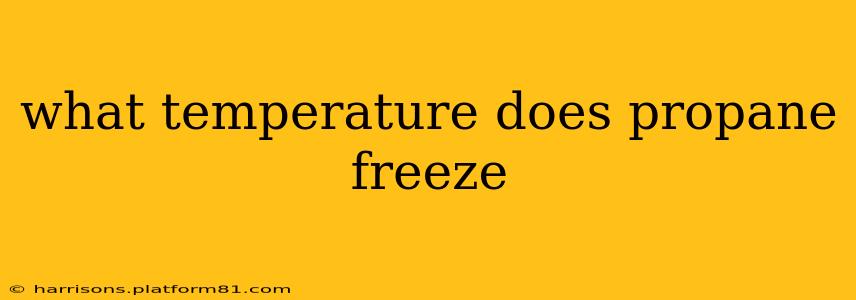Propane, a widely used fuel for heating, cooking, and vehicles, boasts several advantages, including its high energy density and relatively clean burning. However, understanding its behavior in cold weather is crucial for safe and efficient use. So, what temperature does propane freeze? The answer isn't as simple as a single number, and this article delves into the complexities to provide a comprehensive understanding.
While propane doesn't technically "freeze" in the way water does, its behavior at extremely low temperatures significantly impacts its usability. Let's explore this further.
What Happens to Propane in Cold Temperatures?
Propane undergoes a phase transition at extremely low temperatures, changing from a gas to a liquid. This transition doesn't involve freezing in the traditional sense—it's more accurate to talk about its liquefaction point. But the terms are often used interchangeably, leading to confusion.
The key here is understanding the difference between propane's boiling point and its freezing point.
-
Boiling Point: The temperature at which a liquid turns into a gas. For propane, this is -44°F (-42°C). Above this temperature, propane exists primarily as a gas.
-
Freezing Point (or more accurately, its melting point): The temperature at which a solid turns into a liquid. For propane, this is significantly colder, at -306°F (-188°C). This is far below any temperature experienced in naturally occurring environments on Earth.
Therefore, while you won't see propane turn solid under normal circumstances, its behavior changes dramatically as temperatures approach its boiling point. It becomes less volatile, meaning it doesn't vaporize as readily. This can impact the efficiency of appliances designed to use propane vapor.
Does Propane Freeze at -44°F?
Many sources state that propane freezes at -44°F (-42°C). This is incorrect. While -44°F is its boiling point, meaning the liquid propane turns into a gas, it doesn’t solidify at this temperature. The confusion arises from the common misunderstanding of the phase transition process. Propane remains a liquid until reaching significantly lower temperatures.
How Does Cold Weather Affect Propane Usage?
Even though propane doesn't freeze solid in typical winter conditions, low temperatures can still affect its performance:
-
Reduced Vapor Pressure: As the temperature drops, the vapor pressure of liquid propane decreases. This means less propane vaporizes, potentially leading to a decrease in the efficiency of propane appliances like stoves, heaters, and grills. You might experience weaker flames or reduced heating output.
-
Increased risk of blockage: In extremely cold conditions, moisture can freeze within propane lines, causing blockages.
What Temperature Does Propane Become Inefficient?
The temperature at which propane becomes noticeably inefficient varies depending on the appliance and its design. However, temperatures below 0°F (-18°C) can start to significantly impact performance. Properly insulated propane tanks and lines can mitigate this issue to some degree.
How Can I Prevent Propane Problems in Cold Weather?
-
Keep Tanks Full: A full propane tank maintains a higher internal pressure, improving vaporization even in cold temperatures.
-
Insulate Tanks and Lines: Insulating propane tanks and lines reduces heat loss and helps maintain adequate vapor pressure.
-
Regular Maintenance: Ensure your propane appliances are regularly inspected and maintained to prevent blockages and ensure efficient operation.
-
Monitor Performance: Pay attention to the performance of your propane appliances. Reduced flame intensity or heating capacity could indicate a problem related to cold temperatures.
In conclusion, while propane's extremely low freezing point means it won't freeze in practical applications, its behavior at lower temperatures requires careful consideration to ensure safe and efficient use. Understanding the impact of cold on propane's vapor pressure and taking preventative measures can help avoid problems during the colder months.
